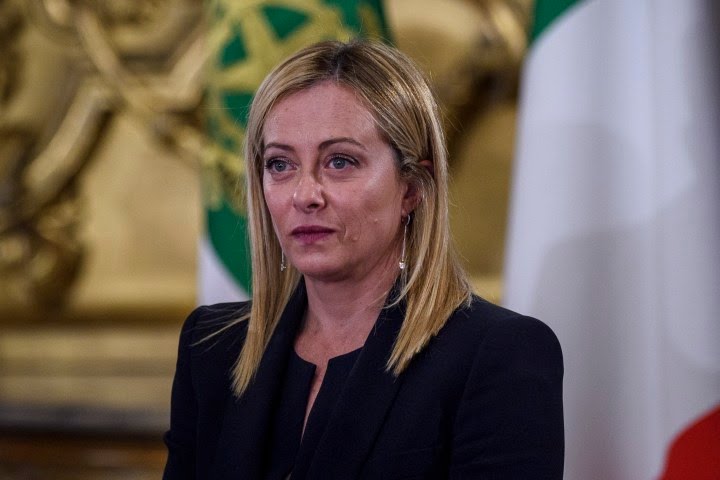Georgia Meloni , the hard-right leader who was sworn in as Italy’s first female prime minister on Saturday, won the election on a campaign built around a promise to block migrant ships and support for traditional “family values” and anti-LGBTQ themes.
Meloni was sworn in by the Italian President Sergio Mattarella in a ceremony taking at the Quirinale Palace in Rome.
She heads an alliance of far-right and center-right parties, her own Brothers of Italy chief among them, and is set to form the most right-wing government Italy has seen in decades.
Meloni’s win in parliamentary elections last month suggests the allure of nationalism remains undimmed in Italy – but her vow to take the country on a hard-right turn still leaves many uncertain what will happen next.
The new government is made up of a coalition with two other right-wing leaders. One is Matteo Salvini, a former interior minister who became the darling of the hard-right in 2018 when he shifted his party, the League, once a northern secessionist party, into a nationalist force.
Meloni’s 24 ministers – six of them women – were being sworn in alongside her on Saturday.
The other is Silvio Berlusconi, the center-right former Italian prime minister widely remembered for his “bunga bunga” sex scandals with young women. Both men have previously publicly expressed admiration for Russian President Vladimir Putin, which has prompted questions over what the coalition’s approach to Russia will be.
And just this week – days before consultations on forming the government were set to begin – secretly recorded audio was circulated in which Berlusconi appeared to lay the blame for Putin’s invasion of Ukraine at Kyiv’s door, and boasted of having reestablished relations with the Russian leader.
“I reconnected a little bit with President Putin, quite a bit, in the sense that for my birthday he gave me 20 bottles of Vodka and a very sweet letter, and I responded with giving him bottles of Lambrusco,” said Berlusconi in the clip, released by Italian news agency LaPresse on Tuesday. The 86-year-old billionaire and media magnate was speaking with Forza Italia party members at the time.
A party spokesperson denied Berlusconi was in touch with Putin, saying he had been telling parliamentarians “an old story referring to an episode many years ago.” Berlusconi defended his comments in an interview with Italian newspaper Corriere della Sera on Thursday, saying they had been taken out of context.
Amid backlash over the comments, Meloni, who has been a strong supporter of Ukraine as it battles Moscow’s invasion, sought to clarify where she and and the coalition would stand once in power.
“I have and always will be clear, I intend to lead a government with a foreign policy that is clear and unequivocal. Italy is fully part of Europe and the Atlantic Alliance. Anyone who does not agree with this cornerstone will not be able to be part of the government, at the cost of not being a government. With us governing, Italy will never be the weak link of the West,” she said.
Nonetheless, liberals within Italy and the European Union are fearful of what the promised rightward turn may mean for the country and its future – while conservative constituents feel only a strong-arm politician, like Meloni, can lead the country out of crisis amid soaring energy costs and high youth unemployment.
“Meloni is not expressing the vote choices of radical right-wing voters, because we have data that shows that she has been voted for by mostly the center-right,” political science professor Lorenzo De Sio of the Luiss Guido Carli University told CNN.
“I would say that the motto for Meloni is to be a sort of new conservative – that is to say, conservativism for the 21st century. She might bear some far-back connection to the post-fascist legacy, but clearly that’s not the core of her political platform now.”
CNN









